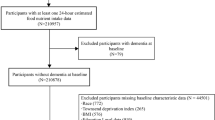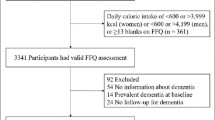Abstract
Background
This study aimed to investigate the association between fructose consumption and all-cause dementia, and Alzheimer’s disease (AD) dementia.
Methods
We used data from the Framingham Offspring Study (FOS) Cohort exams 5 through 9. Fructose consumption was quantified using a food-frequency questionnaire (FFQ) at cohort examinations 5 and participants were dementia-free at baseline. Surveillance for incident events commenced at examination 9 through 2014. Multivariable Cox proportional hazards regression was used to estimate the hazard ratios for the association between fructose consumption and incidence of all-cause dementia and AD dementia.
Results
Over a mean follow-up of 15.2 (interquartile range, 12.3–17.1) years (31715.1 person-years), there were 233 dementia events of which 163 were AD dementia (70.0%). After multivariate adjustments, individuals with the highest consumption of fructose had a higher risk of all-cause dementia, and AD dementia when comparing daily cumulative consumption to 0 per week (reference), with HRs of 1.49 (95% 1.14–1.84, P for trend < 0.001) for all-cause dementia, and 1.60 (95%CI 1.22–2.01, P-trend < 0.001) for AD dementia. And the comparable results were shown in the subgroups for individuals with median consumption of fructose.
Conclusion
Fructose consumption was associated with a higher risk of all-cause dementia and AD dementia.


Similar content being viewed by others
Data Availability: Data described in the manuscript, code book, and analytic code will not be made available because the authors are prohibited from distributing or transferring the data and codebooks on which their research was based to any other individual or entity under the terms of an approved NHLBI Framingham Heart Study Research Proposal and Data and Materials Distribution Agreement through which the authors obtained these data.
References
Lennon JC, Aita SL, Bene VAD, Rhoads T, Resch ZJ, Eloi JM, Walker KA (2022) Black and White individuals differ in dementia prevalence, risk factors, and symptomatic presentation. Alzheimers Dement 18, 1461–1471.doi:https://doi.org/10.1002/alz.12509.
Wu YT, Beiser AS, Breteler MMB, Fratiglioni L, Helmer C, Hendrie HC, Honda H, Ikram MA, Langa KM, Lobo A, Matthews FE, Ohara T, Peres K, Qiu C, Seshadri S, Sjolund BM, Skoog I, Brayne C (2017) The changing prevalence and incidence of dementia over time - current evidence. Nat Rev Neurol 13, 327–339.doi:https://doi.org/10.1038/nrneurol.2017.63.
Garre-Olmo J (2018) [Epidemiology of Alzheimer’s disease and other dementias]. Rev Neurol 66, 377–386
Wang K, Liu H (2021) Association between widespread pain and dementia, Alzheimer’s disease and stroke: a cohort study from the Framingham Heart Study. Reg Anesth Pain Med 46, 879–885.doi:https://doi.org/10.1136/rapm-2021-102733.
Zhou S, Wang K (2021) Childhood Secondhand Smoke Exposure and Risk of Dementia, Alzheimer’s Disease and Stroke in Adulthood: A Prospective Cohort Study. J Prev Alzheimers Dis 8, 345–350.doi:https://doi.org/10.14283/jpad.2021.10.
Wang K, Liu H (2021) Early-Onset Subgroup of Type 2 Diabetes and Risk of Dementia, Alzheimer’s Disease and Stroke: A Cohort Study. J Prev Alzheimers Dis 8, 442–447.doi:https://doi.org/10.14283/jpad.2021.35.
Taylor SR, Ramsamooj S, Liang RJ, Katti A, Pozovskiy R, Vasan N, Hwang SK, Nahiyaan N, Francoeur NJ, Schatoff EM, Johnson JL, Shah MA, Dannenberg AJ, Sebra RP, Dow LE, Cantley LC, Rhee KY, Goncalves MD (2021) Dietary fructose improves intestinal cell survival and nutrient absorption. Nature 597, 263–267.doi:https://doi.org/10.1038/s41586-021-03827-2.
DeChristopher LR, Tucker KL (2018) Excess free fructose, high-fructose corn syrup and adult asthma: the Framingham Offspring Cohort. Br J Nutr 119, 1157–1167.doi:https://doi.org/10.1017/S0007114518000417.
Tappy L, Le KA (2010) Metabolic effects of fructose and the worldwide increase in obesity. Physiol Rev 90, 23–46.doi:https://doi.org/10.1152/physrev.00019.2009.
Dernini S, Berry EM, Serra-Majem L, La Vecchia C, Capone R, Medina FX, Aranceta-Bartrina J, Belahsen R, Burlingame B, Calabrese G, Corella D, Donini LM, Lairon D, Meybeck A, Pekcan AG, Piscopo S, Yngve A, Trichopoulou A (2017) Med Diet 4.0: the Mediterranean diet with four sustainable benefits. Public Health Nutr 20, 1322–1330.doi:https://doi.org/10.1017/S1368980016003177.
Di Daniele N, Noce A, Vidiri MF, Moriconi E, Marrone G, Annicchiarico-Petruzzelli M, D’Urso G, Tesauro M, Rovella V, De Lorenzo A (2017) Impact of Mediterranean diet on metabolic syndrome, cancer and longevity. Oncotarget 8, 8947–8979.doi:https://doi.org/10.18632/oncotarget.13553.
Roman GC, Jackson RE, Gadhia R, Roman AN, Reis J (2019) Mediterranean diet: The role of long-chain omega-3 fatty acids in fish; polyphenols in fruits, vegetables, cereals, coffee, tea, cacao and wine; probiotics and vitamins in prevention of stroke, age-related cognitive decline, and Alzheimer disease. Rev Neurol (Paris) 175, 724–741.doi:https://doi.org/10.1016/j.neurol.2019.08.005.
Ross AP, Bartness TJ, Mielke JG, Parent MB (2009) A high fructose diet impairs spatial memory in male rats. Neurobiol Learn Mem 92, 410–416.doi:https://doi.org/10.1016/j.nlm.2009.05.007.
Stranahan AM, Norman ED, Lee K, Cutler RG, Telljohann RS, Egan JM, Mattson MP (2008) Diet-induced insulin resistance impairs hippocampal synaptic plasticity and cognition in middle-aged rats. Hippocampus 18, 1085–1088.doi:https://doi.org/10.1002/hipo.20470.
Dawber TR, Meadors GF, Moore FE, Jr. (1951) Epidemiological approaches to heart disease: the Framingham Study. Am J Public Health Nations Health 41, 279–281.doi:https://doi.org/10.2105/ajph.41.3.279.
Feinleib M, Kannel WB, Garrison RJ, McNamara PM, Castelli WP (1975) The Framingham Offspring Study. Design and preliminary data. Prev Med 4, 518–525.doi:https://doi.org/10.1016/0091-7435(75)90037-7.
Sawicki CM, Jacques PF, Lichtenstein AH, Rogers GT, Ma J, Saltzman E, McKeown NM (2021) Whole- and Refined-Grain Consumption and Longitudinal Changes in Cardiometabolic Risk Factors in the Framingham Offspring Cohort. J Nutr 151, 2790–2799.doi:https://doi.org/10.1093/jn/nxab177.
Rimm EB, Giovannucci EL, Stampfer MJ, Colditz GA, Litin LB, Willett WC (1992) Reproducibility and validity of an expanded self-administered semiquantitative food frequency questionnaire among male health professionals. Am J Epidemiol 135, 1114–1126; discussion 1127–1136. doi:https://doi.org/10.1093/oxfordjournals.aje.a116211.
American Psychatric Association.Arlington V (2000) Diagnostic and Statistical Manual of Mental Disorders.4th ed, American Psychiatric Publishing
Macfarlane GJ, Barnish MS, Jones GT (2017) Persons with chronic widespread pain experience excess mortality: longitudinal results from UK Biobank and meta-analysis. Ann Rheum Dis 76, 1815–1822.doi:https://doi.org/10.1136/annrheumdis-2017-211476.
Lin H, Sardana M, Zhang Y, Liu C, Trinquart L, Benjamin EJ, Manders ES, Fusco K, Kornej J, Hammond MM, Spartano NL, Pathiravasan CH, Kheterpal V, Nowak C, Borrelli B, Murabito JM, McManus DD (2020) Association of Habitual Physical Activity With Cardiovascular Disease Risk. Circ Res 127, 1253–1260.doi:https://doi.org/10.1161/CIRCRESAHA.120.317578.
Stanhope KL (2016) Sugar consumption, metabolic disease and obesity: The state of the controversy. Crit Rev Clin Lab Sci 53, 52–67.doi:https://doi.org/10.3109/10408363.2015.1084990.
Galderisi A, Giannini C, Van Name M, Caprio S (2019) Fructose Consumption Contributes to Hyperinsulinemia in Adolescents With Obesity Through a GLP-1-Mediated Mechanism. J Clin Endocrinol Metab 104, 3481–3490. doi:https://doi.org/10.1210/jc.2019-00161.
Jensen T, Abdelmalek MF, Sullivan S, Nadeau KJ, Green M, Roncal C, Nakagawa T, Kuwabara M, Sato Y, Kang DH, Tolan DR, Sanchez-Lozada LG, Rosen HR, Lanaspa MA, Diehl AM, Johnson RJ (2018) Fructose and sugar: A major mediator of non-alcoholic fatty liver disease. J Hepatol 68, 1063–1075. doi:https://doi.org/10.1016/j.jhep.2018.01.019.
Bray GA (2013) Energy and fructose from beverages sweetened with sugar or high-fructose corn syrup pose a health risk for some people. Adv Nutr 4, 220–225.doi:https://doi.org/10.3945/an.112.002816.
Agrawal R, Gomez-Pinilla F (2012) ‘Metabolic syndrome’ in the brain: deficiency in omega-3 fatty acid exacerbates dysfunctions in insulin receptor signalling and cognition. J Physiol 590, 2485–2499.doi:https://doi.org/10.1113/jphysiol.2012.230078.
Ye X, Gao X, Scott T, Tucker KL (2011) Habitual sugar intake and cognitive function among middle-aged and older Puerto Ricans without diabetes. Br J Nutr 106, 1423–1432.doi:https://doi.org/10.1017/S0007114511001760.
Pase MP, Himali JJ, Beiser AS, Aparicio HJ, Satizabal CL, Vasan RS, Seshadri S, Jacques PF (2017) Sugar- and Artificially Sweetened Beverages and the Risks of Incident Stroke and Dementia: A Prospective Cohort Study. Stroke 48, 1139–1146.doi:https://doi.org/10.1161/STROKEAHA.116.016027.
Stephan BC, Wells JC, Brayne C, Albanese E, Siervo M (2010) Increased fructose intake as a risk factor for dementia. J Gerontol A Biol Sci Med Sci 65, 809–814.doi:https://doi.org/10.1093/gerona/glq079.
Miao H, Chen K, Yan X, Chen F (2021) Sugar in Beverage and the Risk of Incident Dementia, Alzheimer’s Disease and Stroke: A Prospective Cohort Study. J Prev Alzheimers Dis 8, 188–193.doi:https://doi.org/10.14283/jpad.2020.62.
Choo VL, Viguiliouk E, Blanco Mejia S, Cozma AI, Khan TA, Ha V, Wolever TMS, Leiter LA, Vuksan V, Kendall CWC, de Souza RJ, Jenkins DJA, Sievenpiper JL (2018) Food sources of fructose-containing sugars and glycaemic control: systematic review and meta-analysis of controlled intervention studies. BMJ 363, k4644.doi:https://doi.org/10.1136/bmj.k4644.
Assuncao N, Sudo FK, Drummond C, de Felice FG, Mattos P (2018) Metabolic Syndrome and cognitive decline in the elderly: A systematic review. PLoS One 13, e0194990.doi:https://doi.org/10.1371/journal.pone.0194990.
Basciano H, Federico L, Adeli K (2005) Fructose, insulin resistance, and metabolic dyslipidemia. Nutr Metab (Lond) 2, 5.doi:https://doi.org/10.1186/1743-7075-2-5.
Borshchev YY, Uspensky YP, Galagudza MM (2019) Pathogenetic pathways of cognitive dysfunction and dementia in metabolic syndrome. Life Sci 237, 116932.doi:https://doi.org/10.1016/j.lfs.2019.116932.
Tahmi M, Palta P, Luchsinger JA (2021) Metabolic Syndrome and Cognitive Function. Curr Cardiol Rep 23, 180.doi:https://doi.org/10.1007/s11886-021-01615-y.
Musso PY, Junca P, Gordon MD (2021) A neural circuit linking two sugar sensors regulates satiety-dependent fructose drive in Drosophila. Sci Adv 7, eabj0186.doi:https://doi.org/10.1126/sciadv.abj0186.
Zhu HY, Hong FF, Yang SL (2021) The Roles of Nitric Oxide Synthase/ Nitric Oxide Pathway in the Pathology of Vascular Dementia and Related Therapeutic Approaches. Int J Mol Sci 22.doi:https://doi.org/10.3390/ijms22094540.
Ohno RI, Ichimaru K, Tanaka S, Sugawa H, Katsuta N, Sakake S, Tominaga YK, Ban I, Shirakawa JI, Yamaguchi Y, Ito E, Taniguchi N, Nagai R (2019) Glucoselysine is derived from fructose and accumulates in the eye lens of diabetic rats. J Biol Chem 294, 17326–17338.doi:https://doi.org/10.1074/jbc.RA119.010744.
Bernstein AM, de Koning L, Flint AJ, Rexrode KM, Willett WC (2012) Soda consumption and the risk of stroke in men and women. Am J Clin Nutr 95, 1190–1199.doi:https://doi.org/10.3945/ajcn.111.030205.
Acknowledgments
We thank the National Heart, Lung, and Blood Institute (NHLBI), Framingham Heart Study (FHS) and the Chongqing General Hospital.
Author information
Authors and Affiliations
Ethics declarations
Conflicts of Interest: The authors declare that they have no conflicts of interest.
Ethical Standards: The study procedures followed were in accordance with the ethical standards of the Institutional Review Board and the Principles of the Declaration of Helsinki.
Additional information
Grant Support: None.
Electronic supplementary material
Rights and permissions
About this article
Cite this article
Yan, J., Zheng, K., Zhang, X. et al. Fructose Consumption is Associated with a Higher Risk of Dementia and Alzheimer’s Disease: A Prospective Cohort Study. J Prev Alzheimers Dis 10, 186–192 (2023). https://doi.org/10.14283/jpad.2023.7
Received:
Accepted:
Published:
Issue Date:
DOI: https://doi.org/10.14283/jpad.2023.7




